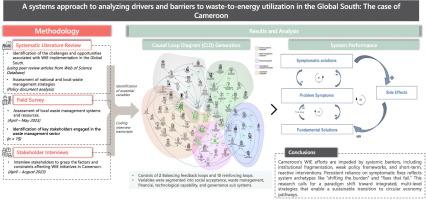分析全球南方国家废物转化为能源的驱动因素和障碍的系统方法:喀麦隆的案例
IF 9.6
1区 环境科学与生态学
Q1 ENVIRONMENTAL STUDIES
引用次数: 0
摘要
废物转化为能源(WtE)的利用是解决日益严重的全球废物危机的一个有希望的解决方案。然而,尽管具有显著的技术潜力,在全球南方实施WtE的进展仍然有限。本研究调查了发展中国家采用WtE的主要驱动因素和障碍,并将重点放在喀麦隆作为案例研究。本研究采用系统思维方法,结合因果循环图分析,并借鉴文献综述、实地调查和利益相关者访谈,确定了关键障碍,包括金融投资不确定性、政策和制度框架薄弱、利益相关者缺乏合作以及公众意识低下。诸如城市清洁运动和改善废物收集等症状性干预措施的持续存在,而没有进行系统改革,反映了“转移负担”和“解决失败”的反复出现的模式,这些模式破坏了长期进展,并维持了对垃圾填埋的依赖。为了克服这些系统性陷阱,本研究提出了一种范式转变,转向将短期激励与长期制度和基础设施改革相结合的有凝聚力的多层次战略。研究结果为寻求在喀麦隆和其他全球南方国家推动可持续循环经济解决方案的政策制定者、从业者和研究人员提供了宝贵的见解。本文章由计算机程序翻译,如有差异,请以英文原文为准。

A systems approach to analysing drivers and barriers to waste-to-energy utilization in the Global South: The case of Cameroon
Waste-to-Energy (WtE) utilization presents a promising solution to the escalating global waste crisis. However, despite its notable technical potential, progress toward WtE implementation in the Global South remains limited. This study investigates the key drivers and barriers to WtE adoption in the global south, with a focus on Cameroon as a case study. Using a systems thinking approach—incorporating causal loop diagram analysis—and drawing on literature reviews, field surveys, and stakeholder interviews, this research identifies critical obstacles including financial investment uncertainty, weak policy and institutional frameworks, lack of stakeholder collaboration, and low public awareness. The persistence of symptomatic interventions, such as city cleanliness campaigns and waste collection improvements without systemic reform, reflects recurring patterns of “shifting the burden” and “fixes that fail,” which undermine long-term progress and sustain dependence on landfilling. To overcome these systemic traps, this study proposes a paradigm shift toward cohesive, multi-level strategies that combine short-term incentives with long-term institutional and infrastructural reforms. The findings provide valuable insights for policymakers, practitioners, and researchers seeking to advance sustainable, circular economy solutions in Cameroon and other Global South contexts.
求助全文
通过发布文献求助,成功后即可免费获取论文全文。
去求助
来源期刊

Sustainable Production and Consumption
Environmental Science-Environmental Engineering
CiteScore
17.40
自引率
7.40%
发文量
389
审稿时长
13 days
期刊介绍:
Sustainable production and consumption refers to the production and utilization of goods and services in a way that benefits society, is economically viable, and has minimal environmental impact throughout its entire lifespan. Our journal is dedicated to publishing top-notch interdisciplinary research and practical studies in this emerging field. We take a distinctive approach by examining the interplay between technology, consumption patterns, and policy to identify sustainable solutions for both production and consumption systems.
 求助内容:
求助内容: 应助结果提醒方式:
应助结果提醒方式:


